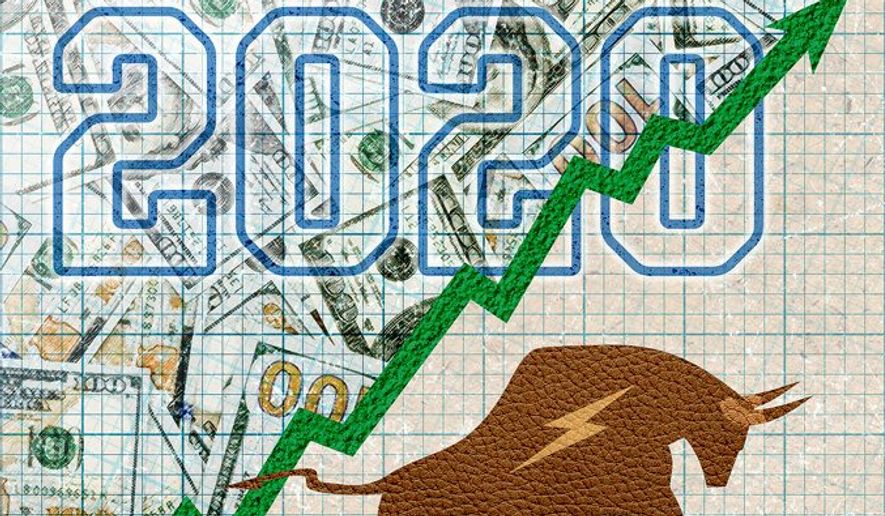OPINION:
Folks who invested in stocks were richly rewarded this year. The S&P 500 index, which tracks most publicly traded equities, is up about 25 percent.
Sadly, too many small investors listened to the left-leaning financial press and economists about President Trump.
They said his trade polices are reckless and cooked up estimates of lost jobs and growth thanks to Chinese retaliation. They warned his tax cuts created a sugar high of consumer spending to be followed by a hangover and little additional business investment that risked a recession.
To ordinary folks, the troubles of brick-and-mortar businesses are visible — shuttered stores and restaurants — but those are just the flip side of growth in online retailing and the advent of Grub Hub.
Facebook, Apple, Amazon, Netflix and Google (FAANG) and other techs drove much of the decade’s stock surge but now face new challenges and antitrust scrutiny.
Scared individual investors pulled about $136 billion out of mutual funds and similar vehicles as the stock market surged and took another hard lesson in the folly of trying to time the market.
What they miss is that the economy is going through a fundamental transformation. All those Chinese imports closed factories and destroyed jobs in the Midwest and Southeast.
The choice President Trump faced was not the status quo or stiff tariffs and Chinese retaliation. If he wrung his hands like his predecessors, the process would have continued. Instead, the United States is now sourcing more products from elsewhere in Asia, Mexico and even at home and creating welcoming customers for what Americans make.
It’s no mystery that workers displaced from farms and factories in the wake of Chinese retaliation find new jobs quickly, or that factory employment was up 30 of 33 months of the Trump presidency.
For “progressive” naysayers, a simple question: If Mr. Trump’s economics is so bad, why are jobs so plentiful and good?
The economic transformation is like those instigated by steam power, the internal combustion engine and moving assembly line. The energy we use is becoming cleaner — natural gas and solar are replacing coal, electric cars are coming into vogue and artificial intelligence is enhancing the goods and services we use rather than increasing their numbers.
Refocusing U.S. trade to countries that honor the rules of the game like Canada, Mexico and soon the U.K. and others — and away from those that cheat unless they agree to reform like China — just ensures that American workers and investors get their fair share of the benefits.
Even if one or more of the FAANGs is broken up, their offspring would have incredible growth opportunities just like the progeny Standard Oil, which created Exxon and several other modern day petroleum giants.
Corporations continue to buy back stocks. Simply, new technologies require fewer investments in big factories than the old, and businesses use the extra cash to reward employees with stock and boost share prices. And institutional and foreign investors continue to pile into U.S. equities.
Globally, the share of GDP saved has increased dramatically. Much of that new financial capital has been wasted on follies like WeWork led by private equity funds managers and investment bankers who get rich preying on others’ dreams. But a lot those savings are finding their way into sound U.S. businesses.
Equities are fairly valued — the price-earnings ratio for the S&P 500 is currently about 24 and that is in line with the 25-year historical average of 25.
The U.S. economy is strong and stable and poised to continue growing in 2020.
Recognizing this, investors have poured into cyclical stocks like banks, manufacturers and oil companies as opposed to defensive stocks like utilities and consumer staples. Corporate profits are expected to advance nearly 10 percent in 2020 and that should enable another 10 percent jump for stocks.
Ordinary investors should not try to pick stocks or time the market — they don’t have the information to find the next Apple with confidence and they face better odds betting on football than trying to call the next market turn.
Invest in an S&P 500 index fund, and perhaps an international index fund to smooth returns — sometimes U.S. equities do better while other times foreign stocks lead. If you are retired, hedge by keeping about 50 percent of your money in Treasuries with 3- to 7-year maturities.
Champagne will again be on sale this time next year.
• Peter Morici is an economist and business professor at the University of Maryland, and a national columnist.




Please read our comment policy before commenting.